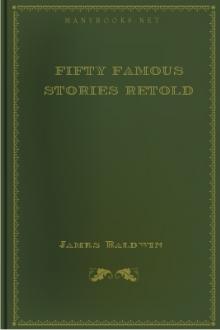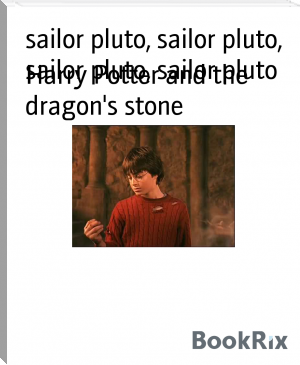Treasure Island by Robert Louis Stevenson (the best electronic book reader .txt) 📕

- Author: Robert Louis Stevenson
- Performer: 0451527046
Book online «Treasure Island by Robert Louis Stevenson (the best electronic book reader .txt) 📕». Author Robert Louis Stevenson
shipmate Billy, at the Admiral Benbow inn. Ah, Bill,
Bill, we have seen a sight of times, us two, since I
lost them two talons,” holding up his mutilated hand.
“Now, look here,” said the captain; “you’ve run me
down; here I am; well, then, speak up; what is it?”
“That’s you, Bill,” returned Black Dog, “you’re in the
right of it, Billy. I’ll have a glass of rum from this
dear child here, as I’ve took such a liking to; and
we’ll sit down, if you please, and talk square, like
old shipmates.”
When I returned with the rum, they were already seated
on either side of the captain’s breakfast-table—Black
Dog next to the door and sitting sideways so as to have
one eye on his old shipmate and one, as I thought, on
his retreat.
He bade me go and leave the door wide open. “None of
your keyholes for me, sonny,” he said; and I left them
together and retired into the bar.
“For a long time, though I certainly did my best to
listen, I could hear nothing but a low gattling; but at
last the voices began to grow higher, and I could pick
up a word or two, mostly oaths, from the captain.
“No, no, no, no; and an end of it!” he cried once. And
again, “If it comes to swinging, swing all, say I.”
Then all of a sudden there was a tremendous explosion of
oaths and other noises—the chair and table went over in
a lump, a clash of steel followed, and then a cry of pain,
and the next instant I saw Black Dog in full flight, and
the captain hotly pursuing, both with drawn cutlasses, and
the former streaming blood from the left shoulder. Just
at the door the captain aimed at the fugitive one last
tremendous cut, which would certainly have split him to
the chine had it not been intercepted by our big signboard
of Admiral Benbow. You may see the notch on the lower side
of the frame to this day.
That blow was the last of the battle. Once out upon
the road, Black Dog, in spite of his wound, showed a
wonderful clean pair of heels and disappeared over the
edge of the hill in half a minute. The captain, for
his part, stood staring at the signboard like a
bewildered man. Then he passed his hand over his eyes
several times and at last turned back into the house.
“Jim,” says he, “rum”; and as he spoke, he reeled a little,
and caught himself with one hand against the wall.
“Are you hurt?” cried I.
“Rum,” he repeated. “I must get away from here. Rum! Rum!”
I ran to fetch it, but I was quite unsteadied by all
that had fallen out, and I broke one glass and fouled
the tap, and while I was still getting in my own way, I
heard a loud fall in the parlour, and running in, beheld
the captain lying full length upon the floor. At the same
instant my mother, alarmed by the cries and fighting, came
running downstairs to help me. Between us we raised his
head. He was breathing very loud and hard, but his eyes
were closed and his face a horrible colour.
“Dear, deary me,” cried my mother, “what a disgrace
upon the house! And your poor father sick!”
In the meantime, we had no idea what to do to help the
captain, nor any other thought but that he had got his
death-hurt in the scuffle with the stranger. I got the
rum, to be sure, and tried to put it down his throat, but
his teeth were tightly shut and his jaws as strong as iron.
It was a happy relief for us when the door opened and Doctor
Livesey came in, on his visit to my father.
“Oh, doctor,” we cried, “what shall we do? Where is he wounded?”
“Wounded? A fiddle-stick’s end!” said the doctor. “No
more wounded than you or I. The man has had a stroke,
as I warned him. Now, Mrs. Hawkins, just you run
upstairs to your husband and tell him, if possible,
nothing about it. For my part, I must do my best to
save this fellow’s trebly worthless life; Jim, you get
me a basin.”
When I got back with the basin, the doctor had already
ripped up the captain’s sleeve and exposed his great
sinewy arm. It was tattooed in several places.
“Here’s luck,” “A fair wind,” and “Billy Bones his
fancy,” were very neatly and clearly executed on the
forearm; and up near the shoulder there was a sketch of
a gallows and a man hanging from it—done, as I
thought, with great spirit.
“Prophetic,” said the doctor, touching this picture
with his finger. “And now, Master Billy Bones, if that
be your name, we’ll have a look at the colour of your
blood. Jim,” he said, “are you afraid of blood?”
“No, sir,” said I.
“Well, then,” said he, “you hold the basin”; and with
that he took his lancet and opened a vein.
A great deal of blood was taken before the captain
opened his eyes and looked mistily about him. First he
recognized the doctor with an unmistakable frown; then
his glance fell upon me, and he looked relieved. But
suddenly his colour changed, and he tried to raise
himself, crying, “Where’s Black Dog?”
“There is no Black Dog here,” said the doctor, “except
what you have on your own back. You have been drinking
rum; you have had a stroke, precisely as I told you;
and I have just, very much against my own will, dragged
you headforemost out of the grave. Now, Mr. Bones—”
“That’s not my name,” he interrupted.
“Much I care,” returned the doctor. “It’s the name of
a buccaneer of my acquaintance; and I call you by it
for the sake of shortness, and what I have to say to
you is this; one glass of rum won’t kill you, but if
you take one you’ll take another and another, and I
stake my wig if you don’t break off short, you’ll die—
do you understand that?—die, and go to your own place,
like the man in the Bible. Come, now, make an effort.
I’ll help you to your bed for once.”
Between us, with much trouble, we managed to hoist him
upstairs, and laid him on his bed, where his head fell
back on the pillow as if he were almost fainting.
“Now, mind you,” said the doctor, “I clear my
conscience—the name of rum for you is death.”
And with that he went off to see my father, taking me
with him by the arm.
“This is nothing,” he said as soon as he had closed the
door. “I have drawn blood enough to keep him quiet
awhile; he should lie for a week where he is—that is
the best thing for him and you; but another stroke
would settle him.”
3
The Black Spot
ABOUT noon I stopped at the captain’s door with some
cooling drinks and medicines. He was lying very much
as we had left him, only a little higher, and he seemed
both weak and excited.
“Jim,” he said, “you’re the only one here that’s worth
anything, and you know I’ve been always good to you.
Never a month but I’ve given you a silver fourpenny for
yourself. And now you see, mate, I’m pretty low, and
deserted by all; and Jim, you’ll bring me one noggin of
rum, now, won’t you, matey?”
“The doctor—” I began.
But he broke in cursing the doctor, in a feeble voice
but heartily. “Doctors is all swabs,” he said; “and
that doctor there, why, what do he know about seafaring
men? I been in places hot as pitch, and mates dropping
round with Yellow Jack, and the blessed land a-heaving
like the sea with earthquakes—what to the doctor know
of lands like that?—and I lived on rum, I tell you.
It’s been meat and drink, and man and wife, to me; and
if I’m not to have my rum now I’m a poor old hulk on a
lee shore, my blood’ll be on you, Jim, and that doctor
swab”; and he ran on again for a while with curses.
“Look, Jim, how my fingers fidges,” he continued in the
pleading tone. “I can’t keep ‘em still, not I. I
haven’t had a drop this blessed day. That doctor’s a
fool, I tell you. If I don’t have a drain o’ rum, Jim,
I’ll have the horrors; I seen some on ‘em already.
I seen old Flint in the corner there, behind you; as
plain as print, I seen him; and if I get the horrors,
I’m a man that has lived rough, and I’ll raise Cain.
Your doctor hisself said one glass wouldn’t hurt me.
I’ll give you a golden guinea for a noggin, Jim.”
He was growing more and more excited, and this alarmed me
for my father, who was very low that day and needed quiet;
besides, I was reassured by the doctor’s words, now quoted
to me, and rather offended by the offer of a bribe.
“I want none of your money,” said I, “but what you owe
my father. I’ll get you one glass, and no more.”
When I brought it to him, he seized it greedily and
drank it out.
“Aye, aye,” said he, “that’s some better, sure enough.
And now, matey, did that doctor say how long I was to
lie here in this old berth?”
“A week at least,” said I.
“Thunder!” he cried. “A week! I can’t do that; they’d
have the black spot on me by then. The lubbers is
going about to get the wind of me this blessed moment;
lubbers as couldn’t keep what they got, and want to
nail what is another’s. Is that seamanly behaviour,
now, I want to know? But I’m a saving soul. I never
wasted good money of mine, nor lost it neither; and
I’ll trick ‘em again. I’m not afraid on ‘em. I’ll
shake out another reef, matey, and daddle ‘em again.”
As he was thus speaking, he had risen from bed with
great difficulty, holding to my shoulder with a grip
that almost made me cry out, and moving his legs like
so much dead weight. His words, spirited as they were
in meaning, contrasted sadly with the weakness of the
voice in which they were uttered. He paused when he
had got into a sitting position on the edge.
“That doctor’s done me,” he murmured. “My ears is
singing. Lay me back.”
Before I could do much to help him he had fallen back again
to his former place, where he lay for a while silent.
“Jim,” he said at length, “you saw that seafaring man today?”
“Black Dog?” I asked.
“Ah! Black Dog,” says he. “HE’S a bad un; but there’s
worse that put him on. Now, if I can’t get away nohow,
and they tip me the black spot, mind you, it’s my old
sea-chest they’re after; you get on a horse—you can,
can’t you? Well, then, you get on a horse, and go to—
well, yes, I will!—to that eternal doctor swab, and
tell him to pipe all hands—magistrates and sich—and
he’ll lay ‘em aboard at the Admiral Benbow—all old
Flint’s crew, man and boy, all on ‘em that’s left. I
was first mate, I was, old Flint’s first mate, and I’m
the on’y one as knows the place. He gave it me at
Savannah, when he lay a-dying, like as if I was to now,
you





Comments (0)